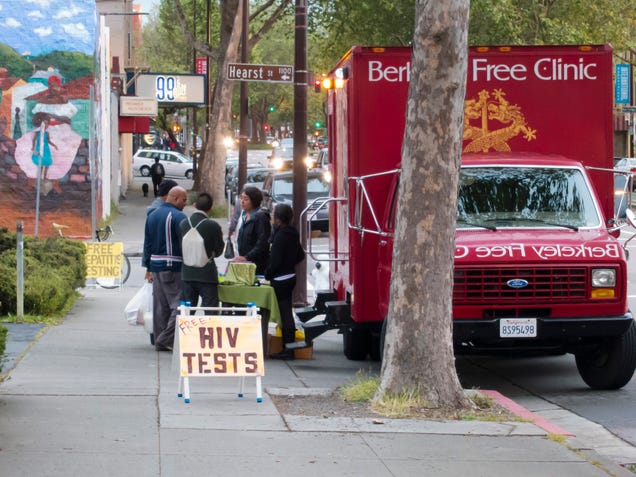
Earlier this month, the World Health Organization (WHO) released guidelines for helping to prevent the spread of HIV in key populations. The group, which also monitors the globe for pandemic outbreaks, says we have to decriminalize sex work and drugs if we want to stop HIV.
HIV can be controlled with medications and safer sex, especially among people in the developed world who can afford treatment. But outside these pockets of privilege, the virus continues to be a health problem of epidemic proportions. Following the principles that many epidemiologists recommend, the WHO seeks to contain the spread of HIV by identifying key populations where it spreads the most quickly. By bringing treatment to these groups, doctors block the main avenues that the virus uses to get into the general human population.
This new report explains who those key populations are, and offers ways we can stop HIV from spreading among their members. These populations include men who have sex with men, transgendered people, people who use or inject drugs, sex workers, and certain groups of adolescents.
What unites these groups is that their activities are either illegal or heavily stigmatized in many parts of the world. That means that they are unlikely to seek out medical help or advice simply because they don't want to be arrested for being gay or having sex for money. In the case of adolescents, many live in countries where they need parental permission to get birth control or medical care. So they, too, must hide their activities from doctors to avoid being "turned in" to their parents.
When you have populations of people who fear that a trip to the doctor may land them in jail, it makes sense that those populations won't follow medical guidelines about safer sex or clean needles. Either they don't know how to reduce their risks; or if they do, they don't have have access to materials that would allow them to have sex or inject drugs safely.
And that's why the WHO is calling for all countries to decriminalize the behaviors and identities of all these groups so that they can get the health care they need.
Under a section in the report called "decriminalizing the behavior of key populations," the WHO writes:
Supporting the health and well-being of key populations whose sexual behaviours, drug use, gender expression or perceived sexual orientation are currently criminalized may require changing legislation and adopting new policies and protective laws in accordance with international human rights standards. Without protective policies and decriminalization of the behaviour of key populations, barriers to essential health services will remain; many people from key populations may fear that seeking health care will expose them to adverse legal consequences.
Specifically they suggest that all countries immediate decriminalize homosexuality and transgender identities. They also want countries to decriminalize sex work and drugs. Finally, they want countries to allow adolescents to receive reproductive health care without notifying their parents.
Here's how the report puts it:
Countries should work toward developing policies and laws that decriminalize same-sex behaviours.Countries should work toward developing policies and laws that decriminalize injection and other use of drugs and, thereby, reduce incarceration. Countries should work toward developing policies and laws that decriminalize the use of clean needles and syringes (and that permit NSPs) and that legalize OST for people who are opioid-dependent. Countries should ban compulsory treatment for people who use and/or inject drugs.Countries should work toward decriminalization of sex work and elimination of the unjust application of non-criminal laws and regulations against sex workers. The police practice of using possession of condoms as evidence of sex work and grounds for arrest should be eliminated.Countries should work toward developing policies and laws that decriminalize same-sex behaviours and nonconforming gender identities. Countries should work towards legal recognition for transgender people.Countries are encouraged to examine their current consent policies and consider revising them to reduce age-related barriers to HIV services and to empower providers to act in the best interest of the adolescent. It is recommended that sexual and reproductive health services, including contraceptive information and services, be provided for adolescents without mandatory parental and guardian authorization/notification.
The WHO isn't known for taking controversial stances on social issues. Instead, they are a pragmatic and clear-eyed organization that stands for public health above all else. Though this report sounds radical, it is actually just plain common sense when looked at from a medical perspective.
What the WHO sees are groups of at-risk people who can't get health care because they have been stigmatized for behaviors that do not harm anyone. The solution isn't to crack down on these groups more, because we've already seen that strategy causes HIV to spread — not just to at-risk groups, but beyond them. The at-risk group becomes a vector that harms all of society. So the only sane solution is to decriminalize things like sex work, so that sex workers get proper health care and don't endanger their clients (who in turn endanger their partners, and so on).
The point is that criminalizing sex work and drug use winds up harming everyone. And the WHO is trying to eliminate that harm, but going to the source of the problem.
Read the full study on the WHO's website.
No comments:
Post a Comment